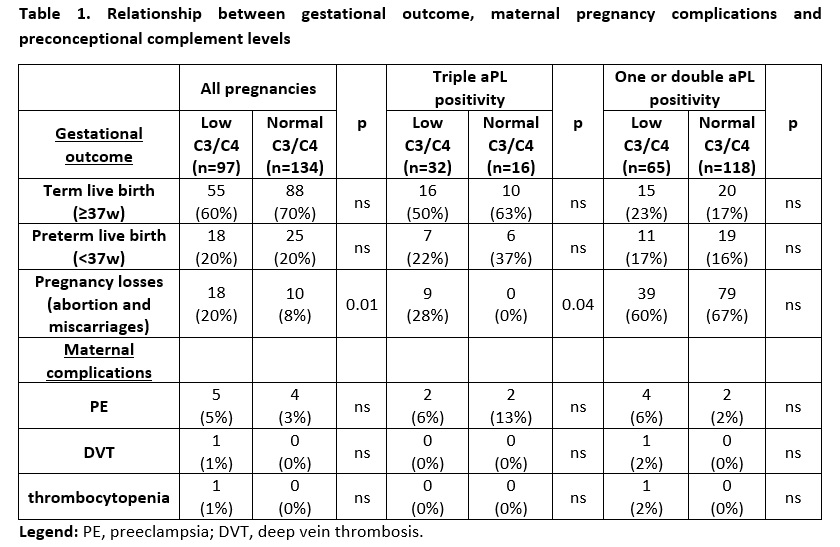Session Information
Session Type: Plenary Session
Session Time: 11:30AM-1:00PM
Background/Purpose: The role of complement in the aPL related pathology has been widely studied in animal models. aPL can induce fetal loss in experimental animals but mice deficient in specific complement components (C4, C3, C5) appear somehow protected. In addition, in pregnant mice injected with aPL, antibody deposition has been found at decidual level causing focal necrosis, apoptosis and neutrophil infiltrates and supporting aPL pathogenetic potential. Instead, human studies did find hypocomplementemia associated to pregnancy complications in patients with obstetric APS. These results, however, are not unanimously confirmed and some studies only show increased levels of complement activation products (i.e. Bb) and not decreased levels of C3 and C4. This can be obviously due to methodological problems, challenging also because of the physiological alteration of complement profile during pregnancy. Recently low levels of C3 and/or C4 in early pregnancy and before pregnancy were found to significantly predict pregnancy complications and loss in a large cohort of primary APS. Therefore, we have thought that it would be interesting to investigate if the simple detection of low C3 and/or C4 could be considered a risk factor for adverse pregnancy outcome in obstetric APS and aPL carriers.
Methods: We performed a multicentric study (487 pregnancies from 10 Italian Rheumatology Centers were included) and collected retrospectively data on pregnancies in women with primary APS (n=293) and aPL carriers with persistent antibody positivity (n=194). Serum C3 and C4 levels were evaluated by nephelometry; hypocomplementemia was defined by local laboratory reference values. Statistical analysis was performed using GraphPad.
Results: Preconceptional complement levels and gestational outcome were available for 96 (49%) aPL carriers pregnancies and 135 (46%) APS pregnancies. In patients with low preconceptional C3 and/or C4, a significantly higher prevalence of pregnancy losses was observed.(p=0.01). A subgroup analysis considered patients with triple aPL positivity. In this subgroup of high risk patients preconceptional low C3 and/or C4 levels were found associated with increased rate of pregnancy loss (p=0.04). On the other hand, in women with single or double aPL positivity, adverse pregnancy outcome was not found related to preconceptional complement levels (Table 1). To note, all pregnancy losses in the subgroup of triple aPL positivity were treated with low dose aspirin and low molecular weight heparin from the pregnancy test positivity. No relationship was found between low preconceptional complement levels and maternal complications (pre-eclampsia, eclampsia, deep vein thrombosis, thrombocytopenia).
Conclusion: Our findings confirm that decreased complement levels before pregnancy are associated with increased risk of adverse outcome in women with aPL, with or without APS. Even in the group of triple aPL positivity, considered per se at high risk, the presence of low C3 and/or C4 seems to predict a worse prognosis. Complement levels are cheap and easy to measure, therefore, they could represent a useful aid to identify patients with aPL at increased risk of pregnancy loss.
To cite this abstract in AMA style:
Nalli C, Lini D, Andreoli L, Crisafulli F, Fredi M, Lazzaroni M, Bitsadze V, Calligaro A, Canti V, Caporali R, Carubbi F, Chighizola C, Conigliaro P, De Carolis C, Del Ross T, Favaro M, Gerosa M, Iuliano A, Khizroeva J, Makatsariya A, Meroni P, Mosca M, Padovan M, Perricone R, Rovere-Querini P, Sebastiani G, Tani C, Tonello M, Zucchi D, Franceschini F, Tincani A. Low Preconceptional Complement Level Is Related with an Adverse Obstetric Outcome in a Multicentric Cohort of Pregnancy in Patients with APS and aPL Positivity [abstract]. Arthritis Rheumatol. 2020; 72 (suppl 10). https://acrabstracts.org/abstract/low-preconceptional-complement-level-is-related-with-an-adverse-obstetric-outcome-in-a-multicentric-cohort-of-pregnancy-in-patients-with-aps-and-apl-positivity/. Accessed .« Back to ACR Convergence 2020
ACR Meeting Abstracts - https://acrabstracts.org/abstract/low-preconceptional-complement-level-is-related-with-an-adverse-obstetric-outcome-in-a-multicentric-cohort-of-pregnancy-in-patients-with-aps-and-apl-positivity/

